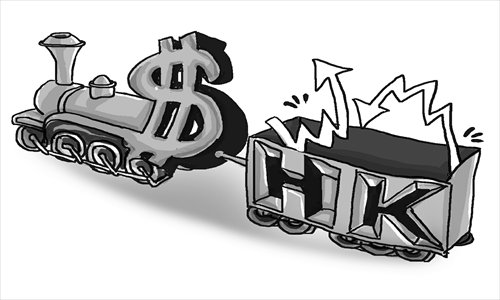HOME >> BUSINESS
HK currency exchange system due for a review
By Louise Ho Source:Global Times Published: 2013-10-22 21:08:01

Illustration: Lu Ting/GT
This month marks the 30th anniversary of the introduction of the linked exchange rate system between the Hong Kong dollar and the US dollar, a system which has stabilized Hong Kong's economy for decades. But the occasion has also sparked debate over whether it is time to adjust the city's currency system.
Leaders in the city have long opposed any such changes. But Hong Kong is at a vastly different place now than it was 30 years ago. By the same token, radical changes throughout the global economy have affected both the standing of the US and the prominence of the greenback. The time has come for Hong Kong to, at the very least, explore its options.
The linked exchange rate system was introduced as Hong Kong - which at the time was using a floating exchange rate regime - sank into financial turmoil after several rounds of Sino-British negotiations about the city's future. To restore public confidence in the Hong Kong dollar, the currency was linked to the US dollar at a fixed rate of 7.8 in 1983 and the peg has persisted until this day.
A fixed exchange rate can allow a small and open economy like Hong Kong's to hedge against financial volatility. With the help of this system, Hong Kong has weathered numerous financial storms, including the tempests kicked up by the Asian financial crisis in 1997, the bankruptcy of Lehman Brothers in 2008 and the ongoing eurozone debt crisis.
The greenback remains the best base money choice for Hong Kong as it is still the most widely used and stable international currency in the International Monetary Fund's Special Drawing Rights basket.
But despite the linked rate system's contribution to Hong Kong, some have recently called for an end to the long-standing peg. Critics argue that the system has allowed quantitative easing policies in the US to accelerate inflation and push up real estate prices in Hong Kong.
Several heavyweights within the city's financial industry - including Joseph Yam Chi-kwong, former head of the Hong Kong Monetary Authority, Peter Wong Tung-shun, Asia Pacific chief executive at HSBC, and David Li Kwok-po, executive director of Bank of East Asia - have already begun lobbying local authorities to review the pegging system.
"There is a need to address the questions as to whether the monetary system of Hong Kong, as currently structured, can continue to serve the public interest of Hong Kong in the best possible manner," Yam wrote in an academic paper published in June last year.
Yam, who helped mastermind the US dollar peg, wrote that the Hong Kong government has limited room to control the price of base money in order to dampen inflation and unemployment with the linked exchange rate system.
Meanwhile, a contingent within Hong Kong's business sector is now advocating a currency peg to the renminbi amid strengthening ties between Hong Kong and the mainland. Signs of halting economic recovery and uncertainties surrounding US monetary policy have also supported appeals for a yuan peg.
Economists are largely in agreement that the Hong Kong dollar should not be linked to the yuan until the currency is fully convertible. The central government is trying to achieve this goal. In fact, the recent opening of Shanghai's pilot free trade zone has been widely seen as a step toward the eventual internationalization of the yuan.
In the meantime, Bank of East Asia's David Li has suggested that the Hong Kong dollar be linked to a basket of currencies, which would include the yuan. Gradually expanding the yuan's place in this proposed basket would reduce the impact of a sudden shift in currency policy, Li has reportedly said.
Officials in Hong Kong have long held that the city has little to gain from amending a system that has served it so well. For instance, Norman Chan Tak-lam, incumbent chief executive of the Hong Kong Monetary Authority, was quoted in an article published last week as saying, "there is neither the need nor the intention to change the linked exchange rate system."
"If the Hong Kong dollar were pegged to the renminbi, Hong Kong's exports and the overall competitiveness of the economy would substantially weaken," Chan also warned. The yuan has appreciated 35 percent against the US dollar since the foreign exchange reform in 2005.
Pegging with the yuan may not be a perfect choice, but it is still a viable option that Hong Kong authorities should not dismiss out of hand.
Many of those who recommend "de-pegging" with the US dollar are not asking for the immediate abandonment of the current peg - they are instead asking for a review of the city's currency system and preparations in advance of the yuan's internationalization. Whatever ultimately is in the best interests of Hong Kong should be implemented.
The author is an editor with the Global Times.
bizopinion@globaltimes.com.cn
Posted in: Comments